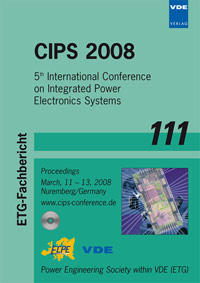Polymer bonded soft magnetic particles for planar inductive devices
Konferenz: CIPS 2008 - 5th International Conference on Integrated Power Electronics Systems
11.03.2008 - 13.03.2008 in Nuremberg, Germany
Tagungsband: CIPS 2008
Seiten: 8Sprache: EnglischTyp: PDF
Persönliche VDE-Mitglieder erhalten auf diesen Artikel 10% Rabatt
Autoren:
Egelkraut, Sven; Ryssel, Heiner (Chair of Electron Devices - University of Erlangen-Nuremberg, Erlangen, Germany)
März, Martin (Fraunhofer Institute for Integrated Systems and Device Technology (IISB), Erlangen, Germany)
Inhalt:
In this study, polymer bonded soft magnetic materials (PBSMM) were investigated for the application as a magnetic core and electromagnetic shielding material in planar inductive devices. Planar transformers and inductors are widely used in high frequency converters. However, conventional prefabricated magnetic cores limit the possibility to integrate inductive devices in arbitrary shaped package volumes and are incompatible to high volume in-line PCB assembly processes, resulting in additional assembly costs. PBSMM feature the prospect to produce several inductive devices on a printed circuit board (PCB) in a single polymer process like injection molding or pressure molding - without the necessity to intervent the PCB manufacturing process. Hence it is possible to reduce the production costs for power electronic systems like gate-driver, DC/DC converters, and EMI filters. In this study, PBSMMs were produced using thermoplastic polyamide 6 and thermosetting epoxy matrix materials. The filler materials were chosen from the wide range of different soft magnetics. The magnetic properties were characterized with ring core test specimens using a computer controlled hysteresis recorder and an impedance analyzer. An exemplary application shows the potentials of planar transformers for gate drivers. Planar inductive devices with PBSMM as magnetic core have great potentials in applications that have to meet a high geometric flexibility and demanding electromagnetic compatibility requirements.


